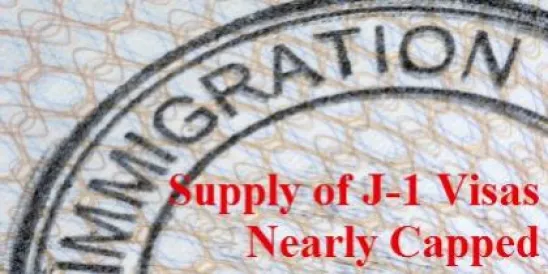In the coming weeks, we expect employers to have a very difficult time locating private sector J-1 sponsors to issue new Forms DS-2019 for interns and trainees. In order to apply for a J-1 visa, an individual must secure a valid Form DS-2019 from a qualified program sponsor that meets the requirements of the Department of State’s Exchange Visitor Program. An individual must also have a host employer that agrees to provide an internship or training opportunity. J-1 exchange program sponsors are typically nonprofit organizations in the private sector. These sponsors work in close collaboration with employers wishing to host J-1 interns and trainees. Every year, thousands of recent graduates and university students from abroad apply for J-1 visas to gain experience working briefly in the United States. We may imminently see a cap reached on the number of J-1 visitors admitted for internship and training opportunities for this calendar year.
The shortage of Forms DS-2019 is already an issue for many program sponsors. Many sponsors are turning new J-1 applicants away. The Department of State’s Bureau of Educational & Cultural Affairs (“ECA”) controls the annual allotment of Forms DS-2019 issued to program sponsors. This year, ECA gave J-1 sponsors an annual allotment of DS-2019s equal to the number of J-1 visitors who entered the United States on their programs in 2011. To secure additional Forms DS-2019, program sponsors must apply to ECA with a request to sponsor more interns and trainees. According to our latest information, very few sponsors have been granted an increase in Forms DS-2019 to expand their programs. This is occurring at a time when the economy is improving and U.S. companies are showing a greater interest in hosting interns and trainees from abroad.
Many program sponsors are already informing employers that they have no additional spaces for new J-1 interns and trainees. The State Department has discretion to create numerical limitations on J-1 visas. The agency may also refuse to grant an increase in a sponsor’s allotment of Forms DS-2019. Unless the State Department acts soon, we anticipate that program sponsors will be unable to accept new applications for interns and trainees by early August.
The State Department should not cap the number of J-1 visas this year without a notice and comment period. This would be a fair and balanced approach to making substantial changes to an important program. U.S. employers are important stakeholders in the State Department’s J-1 intern and trainee program. The State Department should hear from employers before capping J-1 visas this year. Any decision to cap J-1 visas should be undertaken with caution, weighing the mission of cultural exchange accomplished through the J-1 visa.




 />i
/>i
